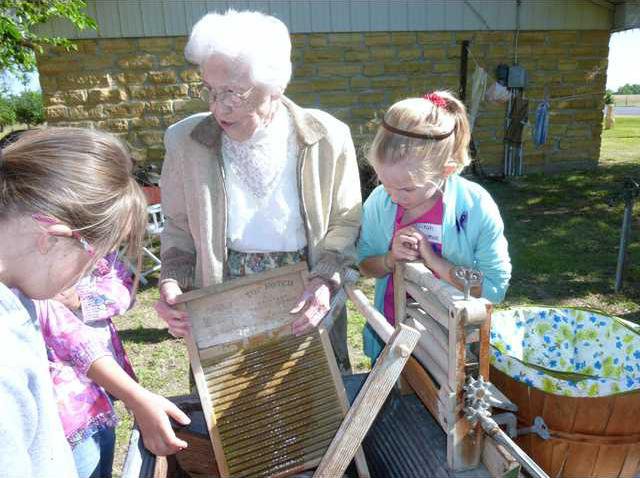Third graders from Great Bend’s public schools got a glimpse of Kansas history on Wednesday when they traveled to the Barton County Historical Museum and Village for Pioneer Day. Barton County Historical Society members, some dressed in old-time apparel, guided 241 students from Jefferson, Lincoln, Eisenhower, Park and Riley elementary schools through nine stations.
Leading the children past a general store exhibit, museum director Beverly Komarek explained it was the “Walmart” of the early 1900s. A women’s saddle from the Robert Button collection of Native American Indian artifacts has high pommels on the front and back so a child could ride along — making it a kind of “car seat” for a horse, Komarek said.
Kids got to make a craft, run laundry through a hand-operated wringer and take part in gunny sack races, three-legged races and a tug of war, but also glimpsed the museum’s treasures. There’s a mosasaur fossil from when Kansas was covered by an inland sea, arrowheads, an iron lung from the old St. Rose Hospital, collections of tractors; and a one-room schoolhouse, to name a few.
“I think this is one of the best learning tools there is,” Komarek said. Students can read about things in a book, but there’s nothing like seeing the actual objects.
Students were also shown the Barton County wall of fame, featuring microchip inventor Jack Kilby and many other famous residents. When asked if any of them thought they could be on that wall 50 years from now, one student said he didn’t expect to wait that long.
One of the biggest lessons Lincoln third grader Jaelynn Adams learned was that early Barton County residents worked and played without electricity. She tried to imagine what that would be like. “It would be hard,” she said, thinking of the washboard and hand-operated ringer. “Without electricity, you have to do it on your own.”
Pioneer Day
Third graders visit Historical Village





